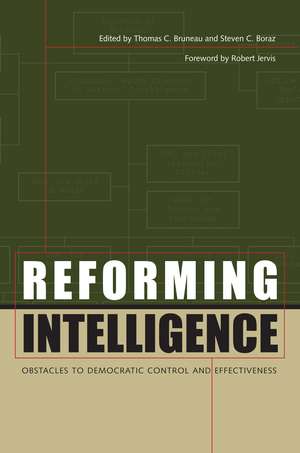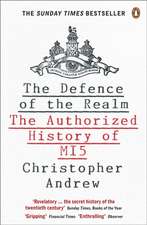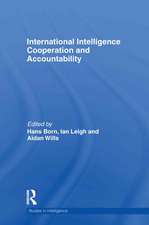Reforming Intelligence: Obstacles to Democratic Control and Effectiveness
Editat de Thomas C. Bruneau, Steven C. Boraz Introducere de Robert Jervisen Limba Engleză Paperback – iun 2007
Reforming Intelligence suggests that intelligence is best conceptualized as a subfield of civil-military relations, and is best compared through institutions. The authors examine intelligence practices in the United States, United Kingdom, and France, as well as such developing democracies as Brazil, Taiwan, Argentina, and Russia. While there is much more data related to established democracies, there are lessons to be learned from states that have created (or re-created) intelligence institutions in the contemporary political climate. In the end, reading about the successes of Brazil and Taiwan, the failures of Argentina and Russia, and the ongoing reforms in the United States yields a handful of hard truths. In the murky world of intelligence, that's an unqualified achievement.
Preț: 320.20 lei
Nou
Puncte Express: 480
Preț estimativ în valută:
61.28€ • 63.74$ • 50.59£
61.28€ • 63.74$ • 50.59£
Carte tipărită la comandă
Livrare economică 15-29 aprilie
Preluare comenzi: 021 569.72.76
Specificații
ISBN-13: 9780292729209
ISBN-10: 0292729200
Pagini: 407
Ilustrații: 9 figures, 5 tables
Dimensiuni: 152 x 229 x 15 mm
Greutate: 0.6 kg
Editura: University of Texas Press
Colecția University of Texas Press
ISBN-10: 0292729200
Pagini: 407
Ilustrații: 9 figures, 5 tables
Dimensiuni: 152 x 229 x 15 mm
Greutate: 0.6 kg
Editura: University of Texas Press
Colecția University of Texas Press
Notă biografică
Thomas Bruneau is a Professor of National Security Affairs, and the Program Manager for Latin America at the Center for Civil-Military Relations, at the Naval Postgraduate School in Monterey, California.
Steven C. Boraz is an Intelligence Surveillance and Reconnaissance Analyst at PEO C4I and Space, in San Diego, California.
Steven C. Boraz is an Intelligence Surveillance and Reconnaissance Analyst at PEO C4I and Space, in San Diego, California.
Cuprins
- Foreword. Intelligence, Civil-Intelligence Relations, and Democracy (Robert Jervis)
- Acknowledgments
- Introduction. Intelligence Reform: Balancing Democracy and Effectiveness (Thomas C. Bruneau and Steven C. Boraz)
- Part One. Challenges to Effective Intelligence in Modern Democracies
- Chapter 1. Executive Privilege: Intelligence Oversight in the United States (Steven C. Boraz)
- Chapter 2. Rethinking Judicial Oversight of Intelligence (Elizabeth Rindskopf Parker and Bryan Pate)
- Chapter 3. U.S. Intelligence Prior to 9/11 and Obstacles to Reform (William J. Lahneman)
- Chapter 4. Keeping "Earthly Awkwardness": Failures of Intelligence in the United Kingdom (Peter Gill)
- Chapter 5. Cultural Legacies of French Intelligence (Douglas Porch)
- Part Two. Democratic Control of Intelligence in New Democracies
- Chapter 6. Structural Change and Democratic Control of Intelligence in Brazil (Marco Cepik)
- Chapter 7. Taiwan's Intelligence Reform in an Age of Democratization (Steven E. Phillips)
- Chapter 8. Establishing Democratic Control of Intelligence in Argentina (Priscila Carlos Brandão Antunes)
- Chapter 9. Romania's Transition to Democracy and the Role of the Press in Intelligence Reform (Cristiana Matei)
- Chapter 10. Transforming Intelligence in South Africa (Kenneth R. Dombroski)
- Chapter 11. Terrorism's Threat to New Democracies: The Case of Russia (Mikhail Tsypkin)
- Chapter 12. Ethical and Moral Issues in Intelligence Reform: The Philippines (Douglas J. Macdonald)
- Conclusion. Best Practices: Balancing Democracy and Effectiveness (Steven C. Boraz and Thomas C. Bruneau)
- Selected Bibliography
- About the Contributors
- Index
Descriere
A timely anthology comprising a dozen case studies written by intelligence experts that collectively outline the best practices of intelligence services in a democratic state.









![Security Arabic [With MP3]: Britain's War in Northern Ireland](https://i1.books-express.ro/bt/9780748646616/security-arabic-with-mp3.jpg)



